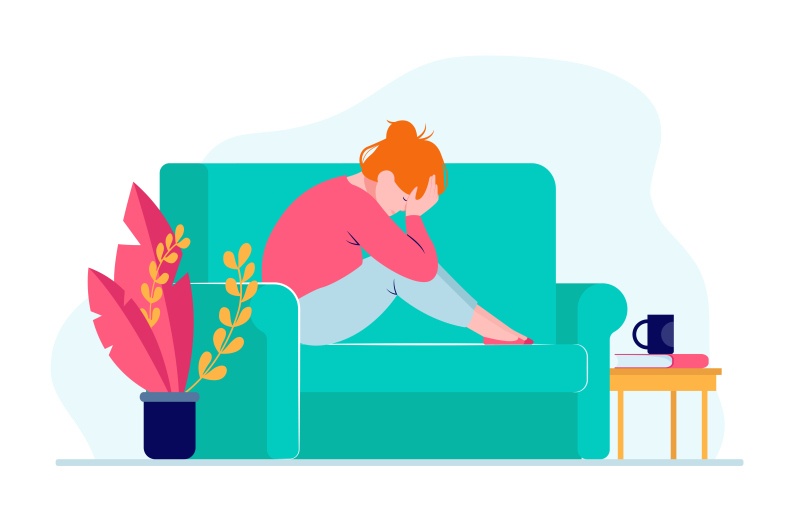As we grow older, the internal processes of our body, from workout recovery to skill cell turnover, tend to slow down and take longer than usual to recharge. This results in the development of signs of aging like wrinkles, fine lines, or fatigue. In some cases, these and other signs of aging may happen earlier than expected. Although it’s not possible to completely reverse the signs of aging naturally, there are countless ways that can help.
Does stress induce skin aging?
Signs of aging may start appear with growing age because of breakdown of collagen and elastin. However, age isn’t the only factor that contributes to this. Stress, anxiety, and depression can harm the skin tissue proteins and lead to premature skin aging.
Psychological stress has the ability to negatively affect the skin. High quantities of cortisol, the stress hormone, can severely breakdown elastin and collagen. In fact, stress can result in inflammation and impair the natural ability of our body to repair and heal itself. According to research, skin aging is generally accompanied with a 2-4 times surge in plasma levels of inflammation. Furthermore, chronic stress can over a period of time result in insulin resistance. This may in turn lead to higher levels of blood sugar. This contributes to glycation, a biological process that reduces skin tissue elasticity ultimately leading to wrinkles & fine lines.
How Stress Causes Premature Skin Aging?
For centuries, the intricate relationship between skin conditions and stress has been documented. In past few years, clinical observations have revealed that psychological stress is associated with the aggravation or onset of multiple skin disorders including premature skin aging.
Psychological stress occurs when we are put under physical, emotional, or mental pressure and that pressure exceeds our adaptive capabilities. During these times, stress hormones like corticotropin-releasing hormone (CRH), epinephrine, and glucocorticoids get released in the body. This results in a variety of behavioral and physiological changes and responses. At times, adverse physiological events may happen if the body’s stress responses are in excess or inadequate.
The human skin is a target of stress responses. It is an immediate skin perceiver and stress can have negative effects on the two major layers: epidermis and dermis. Stress conditions tend to exert their effects on skin through the hypothalamic-pituitary-adrenal (HPA) axis. Hypothalamus neurons stimulate the secretion of corticotropin-releasing hormone (CRH) upon sensing stress where it binds to the CRH receptor type-1 (CRH-R1). They also promote the stimulation of proopiome-lanocortin (POMC)-derived neuropeptides, including β-endorphin, adrenocorticotropin (ACTH), and α-melanocyte stimulating hormone (α-MSH). This, in turn, leads to the stimulation of cortisol (the primary stress hormone) and corticosterone.
Furthermore, stress is also responsible for promoting the release of catecholamines via the sympathetic- adrenal medullary (SAM) axes. Adrenal medulla’s inner layer then stimulates the release of epinephrine (adrenaline) and norepinephrine (nonadrenaline) after getting activated by stress. This, in turn, leads to decreased skin blood flow and altered inflammation and immune functions, including but not limited to lymphocyte trafficking, proliferation, circulation, and cytokine production.
Few tips on how to deal with it
Let us find out some easy ways to deal with stress.
- Take frequent breaks: You should take regular breaks while at home or workplace. You should limit the usage of gadgets such as smartphones, laptops, etc. You should completely cut down on the use of gadgets at least 1-2 hours before your sleep time. Also, you must have a sound and uninterrupted sleep of at least 7-9 hours every day.
- Take good care of yourself: There is no denying the fact that stress can be difficult to manage but you can divert your attention from it. For this, you need to work out for about 45-60 minutes every day, take a jog, swim for 30-45 minutes or even do some facial exercises. Engage relaxing activities like gardening or painting, listening to instrumental music or meditation. Eat healthy and abstain from tobacco, alcohol, or substance use.
- Connect with your community: You should regularly reach out to your community- or faith-based organizations by connecting through social media, phone, or email till the time social distancing measures are in place.
- Never hesitate to ask for help: In a majority of cases, most of us believe that asking for help or guidance from our loved ones would make us a topic of mockery or jokes. If you don’t have someone to talk with in your family or friend circle, please talk with a professional counselor, social worker, or psychologist. Don’t take any wrong step ever and seek help, if required, at the earliest, don’t keep waiting for things to get aggravated.
- Go easy on yourself: You need to accept that you cannot make everyone happy around you at all times. There will be good times and bad times in life, and they are inevitable. Do yourself a favor and don’t think much about things, people, relationships, or conduct of others. You cannot control everyone and everything in life and that’s the start and the end of it.
Remember, it’s your life and health and you need to always pamper the most important person in your life – you!

